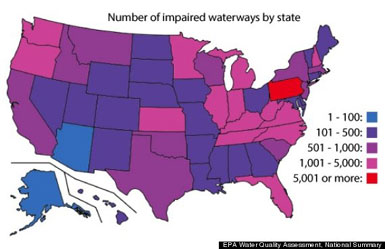In what’s become a hugely controversial move, the EPA issued the "Waters of the United States" rule, which clarifies which waters are under the jurisdiction of the Clean Water Act.
The rule restores protection for two million miles of streams and 20 million acres of wetlands, safeguarding drinking water supplies for a third of Americans, and for ecosystems. About 55% of US streams and rivers are degraded from pollution, where people can’t drink the water or even swim in it. State laws are often weak and lack enforcement.

But until now, EPA couldn’t address that pollution because of two Supreme Court decisions that said EPA could not regulate isolated wetlands. That led to confusion about where to draw the line – could EPA regulate pollution in streams that connect to that wetland?, for example.
You can imagine the confusion that ensued as EPA tried to figure out case by case where they had authority to regulate polluters.
"For the water in rivers and lakes in our communities that flow to our drinking water to be clean, the streams and wetlands that feed them need to be clean too," explains Gina McCarthy, who heads the EPA.
Until now, the Clean Water Act covered "navigable waters" such as the Mississippi River and Lake Erie but it was vague on how far upstream EPA’s authority extended to keep water bodies clean.
The Problem
Industrial agriculture facilities dumped 206 million pounds of toxic chemicals into waterways in 2012, according to Environment America’s "Wasting our Waterways" report. But court cases brought by polluters so diluted the Clean Water Act that EPA hasn’t been able to respond.
9% of that waste came from Tyson Foods, and four of the top 10 polluters are corporate agribusinesses – an industry responsible for much of the nitrogen waste that creates the massive dead zone in the Gulf of Mexico.
But EPA gave them a free pass.
"The rule grants immunity to industrial-scale livestock facilities and includes an exclusion that allows industries to escape treatment requirements by impounding waters and claiming it is a waste treatment system, or by discharging wastes into wetlands," says the WaterKeeper Alliance.
The Solution
Grounded in science, and shaped by 1 million public comments and 400 meetings, EPA’s new rule protects streams and wetlands without creating any new requirements for farms, forestry or ranch operations. "They will keep all the exemptions they currently enjoy, says McCarthy.
87% of the people who commented want these waters protected, including businesses that depend on clean water, and hunters, who want clean headwaters that support fish, birds and other wildlife.
The rule comes into play for farmers, for example, if they dam a stream to make a pond for livestock or if a developer fills in a wetland to build a house or a fossil company wants an oil pipeline to cross a creek, explains Politico.
"No longer will the Supreme Court’s confusing decisions on the issue allow dirty fossil fuel companies to threaten people’s health by dumping toxins into our lakes, rivers, and streams. This vital safeguard puts an end to over a decade of polluters taking advantage of muddled law by restoring the Clean Water Act," says Sierra Club.
Huge Pushback Ensues
"The only people with reason to oppose the rule are polluters who want to threaten our clean water," notes Brian Deese, President Obama’s top environmental adviser.
Farmers and ranchers are the most adamant critics, inaccurately insisting they will have to get expensive permits and go through federal review for everyday tasks like digging ditches and spraying fertilizer. Every depression that happens to fill with water could be regulated they say. Real estate developers are also against it.
Republicans have been up in arms since the rule was first proposed because of its "massive overreach." EPA will regulate every puddle and ditch, they moan, and take away private property rights. About 20 "blue dog" Democrats have joined them.
In addition to the inevitable lawsuits, the House passed a bill that repeals it – before EPA even unveiled the rule – and a companion bill is moving forward in the Senate.
Says Speaker John Boehner (R-OH): "The administration’s decree to unilaterally expand federal authority is a raw and tyrannical power grab that will crush jobs."
"The EPA has set themselves up to increase federal control over private lands, and I will not allow it," says Senator Inhofe (R-OK). "Our committee is planning for a markup on S. 1140 this summer, as we continue our work to halt EPA’s unprecedented land grab and refocus its job on protecting traditional navigable waters from pollution.
President Obama says it "will provide the clarity and certainty businesses and industry need about which waters are protected by the Clean Water Act, and it will ensure polluters who knowingly threaten our waters can be held accountable."
"Even mighty rivers start small, taking on volume from wetlands and tributaries as water flows downhill. Pollution at any point along the journey threatens all the waters downstream," says the Natural Resource Defense Council (NRDC).
"The wetlands and waterways this rule will defend help protect our communities from flooding. They filter industrial, agricultural and urban pollutants out of our water. They provide habitat for wildlife. And they help to recharge groundwater supplies," NRDC explains.
"We need our Senate to put our future first, put this pernicious legislation to bed and let the people who keep our water clean do the job we’re counting on them to do," adds NRDC.
Learn more about the history of this ruling:

